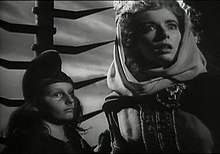Macduff's son
| Macduff's Son | |
|---|---|

Christopher Welles (left) as Macduff's son in Orson Welles' controversial film adaptation Macbeth (1948)
|
|
| Creator | William Shakespeare |
| Play | Macbeth |
| Date | Uncertain, 1603-1607 |
| Source | Holinshed's Chronicles |
| Family |
Macduff, father Lady Macduff, mother unnamed siblings |
| Role | One of Macbeth's murder victims |
| Quote | "Thou liest, thou shag-haired villain!" (4.2) |
Macduff's son is a character in William Shakespeare's tragedy Macbeth (1606). His name and age are not established in the text, and, typical of Shakespeare's child characters, the boy is cute and clever. While Lady Macduff and her children are mentioned in Holinshed's Chronicle as the innocent victims of Macbeth's cruelty, Shakespeare is completely responsible for developing Macduff's son as a character.
The boy appears in only one scene (4.2), in which he briefly banters with his mother and is then murdered by Macbeth's thugs. The scene's purpose is twofold: it provides Shakespeare's audience with a thrillingly horrific moment, and it underscores the depravity into which Macbeth has fallen. The brutal scene has often been cut in modern performance.
Macduff's son is viewed as a symbol of the youthful innocence Macbeth hates and fears, and the scene has been compared by one critic to the biblical Massacre of the Innocents.
In 4.2., Lady Macduff bewails her husband's desertion of home and family, then falsely tells her son that his father is dead. The boy does not believe her and says that if his father were really dead, she'd cry for him, and if she didn't then it would "be a good sign that I should quickly have a new father." Macbeth's henchmen arrive, and, when they declare Macduff a traitor, the boy leaps forward to defend his absent father. One of the henchmen stabs the boy who cries to his mother as he dies, "Run away, I pray you!". This highlights the loyalty, affection and love which make up this character.
The on-stage slaughter of Macduff's son was often cut in 19th century performances on the grounds of taste. The child was carried off-stage, and the murder left to the spectators' imaginations. Very often, the entire scene was cut, not only on the grounds of taste, but, in an age of elaborate scenery and lengthy scene shifting, on time constraints and production costs in mounting a superfluous scene verbally summarized to good effect almost immediately in 4.3.
Samuel Taylor Coleridge commented:
This scene, dreadful as it is, is still a relief, because a variety, because domestic, and therefore soothing, as associated with the only real pleasures of life. The conversation between Lady Macduff and her child heightens the pathos, and is preparatory for the deep tragedy of their assassination. Shakspeare's fondness for children is every where shown;—in Prince Arthur, in King John; in the sweet scene in the Winter's Tale between Hermione and her son; nay, even in honest Evans's examination of Mrs. Page's schoolboy. To the objection that Shakspeare wounds the moral sense by the unsubdued, undisguised description of the most hateful atrocity—that he tears the feelings without mercy, and even outrages the eye itself with scenes of insupportable horror—I, omitting Titus Andronicus, as not genuine, and excepting the scene of Gloster's blinding in Lear, answer boldly in the name of Shakspeare, not guilty.
...
Wikipedia
